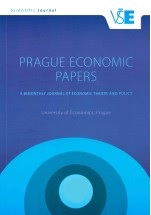Social Welfare Effects of Progressive Income Taxation under Increasing Inequality
Social Welfare Effects of Progressive Income Taxation under Increasing Inequality
Author(s): Saša Ranđelović, Marko VladisavljevićSubject(s): Micro-Economics, Welfare services
Published by: Vysoká škola ekonomická v Praze
Keywords: Optimal income taxation; tax progressivity; inequality; labour supply; social welfare
Summary/Abstract: During the 2008 economic crisis, labour market inactivity, unemployment and work informality in Serbia rose substantially, triggering a salient increase in Gini-measured inequality (by 4.3 pp), while income tax progressivity remained very low. Using the micro- simulation and utility function estimation techniques on 2007 and 2012 household survey data for Serbia, we compare the social welfare effects of a hypothetical shift from flat to progressive taxation, before and after the crisis. We find that a shift from flat to progressive tax and the consequent behavioural response lead to a reduction in inequality, a rise in total labour supply and an increase in the overall social welfare in both years. Although the decrease in inequality is higher in 2012, the overall welfare effects are slightly larger in 2007, due to the stronger labour supply response and the stronger disutility of work found in the latter year. This may suggest that a rise in inequality does not per se create a stronger case for progressive taxation, as the welfare effects are considerably driven by the structure of income-leisure preferences.
Journal: Prague Economic Papers
- Issue Year: 29/2020
- Issue No: 5
- Page Range: 575-599
- Page Count: 25
- Language: English

